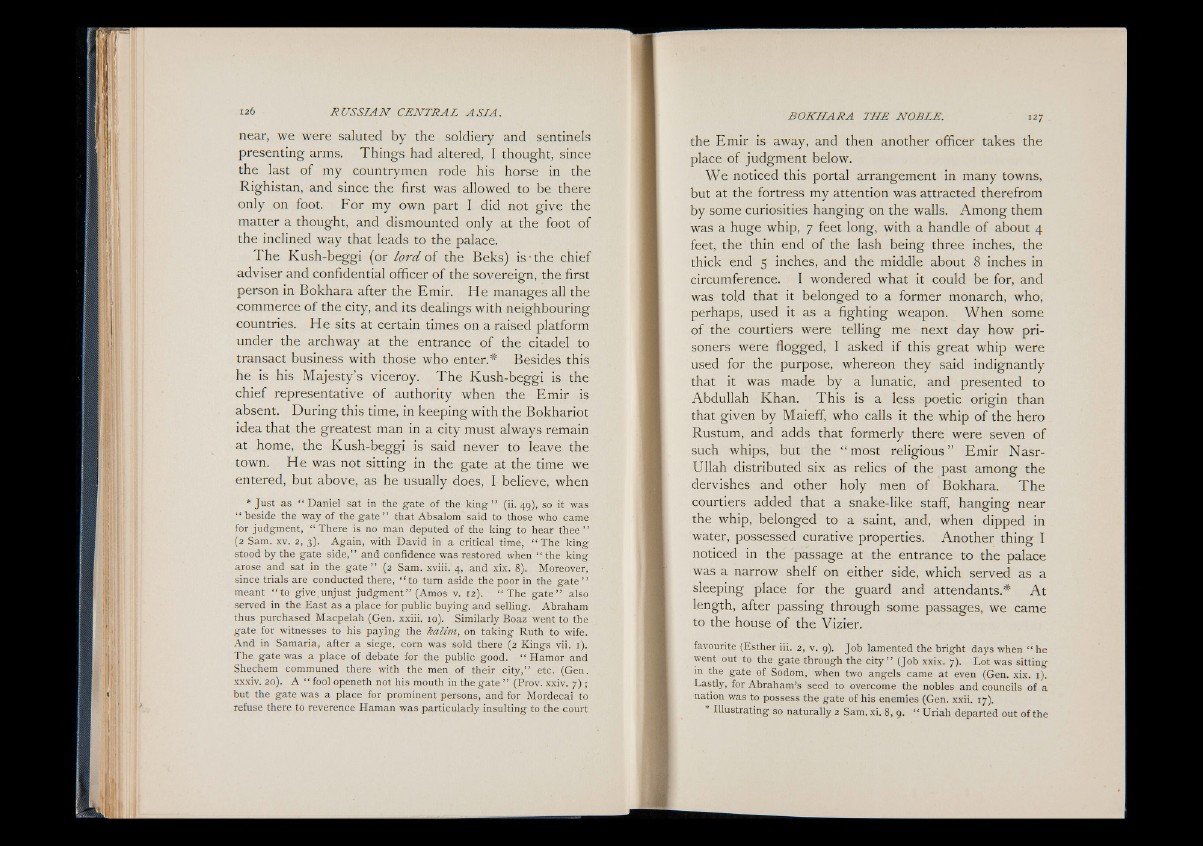
near, we were saluted by the soldiery and sentinels
presenting arms. Things had altered, I thought, since
the last of my countrymen rode his horse in the
Righistan, and since the first was allowed to be there
only on foot. For my own part I did not give the
matter a thought, and dismounted only at the foot of
the inclined way that leads to the palace.
The Kush-beggi (or lord of the Beks) is • the chief
adviser and confidential officer of the sovereign, the first
person in Bokhara after the Emir. He manages all the
commerce of the city, and its dealings with neighbouring
countries. He sits at certain times on a raised platform
under the archway at the entrance o f the. citadel to
transact business with those who enter.* Besides this
he is his Majesty’s viceroy. The Kush-beggi is the
chief representative of authority when the Emir is
absent. During this time, in keeping with the Bokhariot
idea that the greatest man in a city must always remain
at home, the Kush-beggi is said never to leave the
town. He was not sitting in the gate at the time we
entered, but above, as he usually does, I believe, when
* Just as “ Daniel sat in the gate of the k ing” (ii. 49), so it was
“ beside the way of the gate” that Absalom said to those who came
for judgment, “ There is no man deputed of the king to hear thee ”
(2 Sam. xv. 2, 3). Again, with David in a critical time, “ The king
stood by the gate side,” and confidence was restored when “ the king
arose and sat in the g a te ” (2 Sam. xviii. 4, and xix. 8). Moreover,
since trials are conducted there, “ to turn aside the poor in the gate ”
meant “ to give.unjust judgment” (Amos v. 12). “ The gate” also
served in the East as a place for public buying and selling. Abraham
thus purchased Macpelah (Gen. xxiii. 10). Similarly Boaz went to the
gate for witnesses to his paying the kalim, on taking Ruth to wife.
And in Samaria, after a siege, corn was sold there (2 Kings vii. 1).
The gate was a place of debate for the public good. “ Hamor and
Shechem communed there with the men of their city,” etc. (Gen.
xxxiv. 20). A “ fool openeth not his mouth in the gate ” (Prov. xxiv. 7) ;
but the gate was a place for prominent persons, and for Mordecai to
refuse there to reverence Haman was particularly insulting to the court
the Emir is away, and then another officer takes the
place of judgment below.
We noticed this portal arrangement in many towns,
but at the fortress my attention was attracted therefrom
by some curiosities hanging on the walls. Among them
was a huge whip, 7 feet long, with a handle of about 4
feet, the 'thin end of the lash being three inches, the
thick end 5 inches, and the middle about 8 inches in
circumference. I wondered what it could be for, and
was told that it belonged to a former monarch, who,
perhaps, used it as a fighting weapon. When some
of the courtiers were telling me next day how prisoners
were flogged, I asked if this great whip were
used for the purpose, whereon they said indignantly
that it was made by a lunatic, and presented to
Abdullah Khan. This is a less poetic origin than
that given by Maieff, who calls it the whip of the hero
Rustum, and adds that formerly there were seven of
such whips, but the “ most religious” Emir Nasr-
Ullah distributed six as relics o f the past among the
dervishes and other holy men of Bokhara. The
courtiers added that a snake-like staff, hanging near
the whip, belonged to a saint, and, when dipped in
water, possessed curative properties. Another thing I
noticed in the passage at the entrance to the palace
was a narrow shelf on either side, which served as a
sleeping place for the guard and attendants.* A t
length, after passing through some passages, we came
to the house of the Vizier.
favourite (Esther iii. 2, v. 9). Job lamented the bright days when “ he
went out to the gate through the city ” (Job xxix. 7). Lot was sitting
in the gate of Sodom, when two angels came at even (Gen. xix. 1).
Lastly, for Abraham’s seed to overcome the nobles and councils of a
nation was to possess the gate of his enemies (Gen. xxii. 17).
* Illustrating so naturally 2 Sam. xi. 8, 9. “ Uriah departed out of the